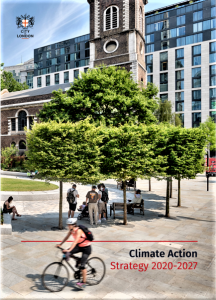Publications
City of London Climate Action Strategy – integrating adaptation into climate plans
1 November 2022

LCCP partner -The City of London Corporation- adopted its ambitious Climate Action Strategy in 2020, with commitments to achieving ambitious net zero emissions targets but crucially, also committing the City Corporation to pursue climate resilience in its buildings, public spaces and infrastructure.
The City Corporation commissioned Buro Happold to undertake an assessment of the climate-related risks that are likely to affect the City of London in support of achieving climate resilience. The resulting Climate Resilience Adaptive Pathways Study established a series of actions that must be taken over time to ensure resilience to climate change, with defined thresholds and trigger points in the future based on the Met Office UKCP18 Climate Projections. The study identified six main risks from climate change to the City of London from hotter, drier summers, warmer, wetter winters, increased extreme weather events and sea level rise: overheating, flooding, water stress, biodiversity loss, new and emerging pests and diseases and disruption to food, trade and infrastructure.
The Strategy is fully funded up until 2027 and progress against annual targets can be viewed on the interactive Climate Action Dashboard.
Under the Strategy, the City Corporation is pursuing three main programmes to further climate resilience. The Mainstreaming Climate Resilience programme is working across the organisation to upskill staff to build climate change considerations into all planning and decision making and establish Climate Adaptation Action Plans for all departments to prepare now for predicted future climate-related disruption. Work under this programme has included an update to the City Plan to ensure climate resilience in new developments and major refurbs, engaging with City Corporation-managed open spaces to raise the profile of climate resilience and raising awareness with business and resident communities of the risks from climate change.
The Cool Streets and Greening programme focuses on resilience in the public realm, parks, gardens and open spaces. A range of projects have been identified to increase the quality and provision of greening and green space, introduce climate resilient and adaptive planting and deliver sustainable drainage schemes (SuDS) to manage surface water flood risk. A year-long partnership with the British Geological Survey concluded in November 2022, which increased understanding of below ground and geological constraints to remove barriers to such projects in the congested streets of the City.
The Resilient Buildings programme focuses on resilience in the City Corporation’s buildings and assets. This has included the production of technical standards to ensure resilience in new build and refurb projects, such as solar shading, ventilation and water management strategies that are aligned with the forthcoming City Plan. Work is also ongoing into the production of a Local Area Energy Plan to build resilient energy networks and increase backup power for critical services, alongside work to protect key assets and critical infrastructure in flood zones.